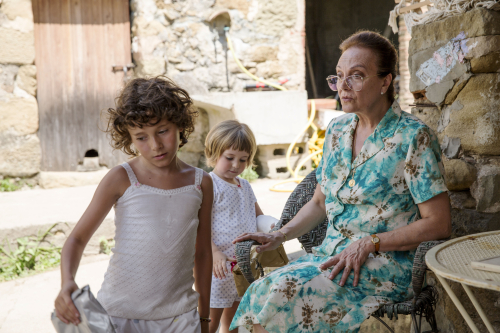
Lucia Faraig/61st BFI London Film Festival
MOVIE REVIEW
Summer 1993 (2017)
They say never work with children or animals, which is great advice for the theater and terrible advice for film. Children’s natural affinity for pretending, their trusting nature and an unquestioning ability to accept their circumstances make them naturals in front of the camera. First-time director Carla Simón Pipó has made something amazing here, since her two main actresses are six and three and give heartbreaking, unaffected performances. The main question is why.
The movie’s marketing material make it extremely clear this movie is autobiographical, which neatly makes a whole swathe of professional criticism of the movie into a personal attack. But it also avoids the key question of why this time of life was the most important. The movie’s theme is how a child, Frida (Laia Artigas) comes to terms with the loss of her mother and adjusting to a new family. But the family isn’t unknown; she is living with her maternal uncle Esteve (David Verdaguer) and aunt Marga (Bruna Cusí), who with her little cousin Anna (Paula Robles) are kindness and consideration personified. The entire extended family is worrying themselves to death over Frida. They regularly visit and bring presents and are a breath of life on the family’s isolated little farm. Even in the village, somewhere in Catalonia, people are generally kind to the new girl, although it slowly becomes clear that the mother died of AIDS and there’s big concern that Frida herself might have HIV. But the movie isn’t political in any sense. The world is the family and its farm. There’s only one scene with other kids, who make a big point to include Frida in their games. But learning how to come out from under the shadow of death is not what the movie is about – which is just as well, as 1996’s “Ponette” (about a small motherless girl coming to terms with her loss) will never be bettered on those themes.
So the question is whether Frida will open up her heart to her new family situation and accept Marga as her new mother. Esteve mostly gets to wander around a workshop and gently undermine Marga’s rules while Marga does the parenting: the doctor’s appointments, the bandages on skinned knees, the cooking. Frida is at times unforgivably cruel to little Anna, who shows cheerful tolerance and acceptance of her new sister’s intrusion into her life while still standing up for herself. But the outcome of this movie is never really in doubt; everyone, including Frida, is just too nice.
What Ms. Simón Pipó should have asked herself is whether this was really the most vital part of this story to tell. Was life all plain sailing and ice cream after this summer? Did Frida not grow up to be a teenage terror controlled by her anger, or a sulky emo kid moping around dwelling on her loss? Did she never use her orphan status as a power play against her friends? Was her mature understanding of what she lost not even a little more interesting than this? Or what if the story of this summer had been done from Marga’s point of view. The story of a woman who has to decide if and/or how to parent a potentially terminally-ill child with little emotional support from her husband, relentless criticism from the in-laws, the threat of harm to her own daughter and at risk of being ostracized by her neighbors for doing so hasn't been told before. It’s disappointing that this story was allowed to be so personal that it wasn’t examined with more objective eyes.
Comments